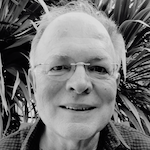
Professor Martin Stanton has a long-standing international clinical and academic career as a teacher, researcher, and psychoanalyst. He has written numerous books and articles in this area and has held senior professorial research and clinical posts at the University of Cambridge, the New School for Social Research, New York City, University College London, Imperial College London, the University of Birmingham, Middlesex University, and the University of Roehampton. He now wishes to present his discoveries in a new, open, striking, and easily accessible way to a wider general public, which has resulted in the Future Perfect Trilogy.
Here he tells us his inspiration for writing Making Sense, the first book in the trilogy.
A core revelation underlies this trilogy. There is no ultimate meaning of life and no appropriate science to help discover it. The reason for this is simple. Thoughts can never completely comprehend nor control feelings. It may well be possible to interpret on some level why a person feels enraptured, panicked or depressed, but such an interpretation may never remove, modify, or restore the core feeling. It is impossible for someone to think themselves at will in or out of feelings of love or hatred. It is equally impossible to halt elated feelings of joy, or reverse the downwards tug of anxiety and depression.
This presents a major problem for contemporary psychology, particularly in its clinical form which uses interpretation to unpack and control feelings. Unfortunately, major difficulties in life cannot be entirely understood, thought out, or effectively removed through reason. There is no ultimate integral logic that  directs and transports thoughts in our mind towards a consummate happy or sad ending, in the way that a DNA code in our cells might impel our body towards the form of its final closure.
directs and transports thoughts in our mind towards a consummate happy or sad ending, in the way that a DNA code in our cells might impel our body towards the form of its final closure.
In the glaring absence of such ultimate meaning of life, Making Sense, the first book in the Future Perfect Trilogy, pioneers a new form of education which starts with those feelings which most vehemently resist rational analysis or causal interpretation. It calls this process ‘making sense’ to challenge a misguided claim of cognitive behavioural psychology to provide a cognitive ‘meaning’, or ‘scientific’ account of such feelings, as well as the therapeutic context in which to contain, if not ‘cure’ them.
The Future Perfect Trilogy jettisons all diagnosis. Making sense here vitiates the importance of interpretation in establishing the immutable meaning of life. It refuses to concord with straight causal lines of medical case history, where a ‘patient’ life is theoretically framed within the axes of a diagnosed mental disorder. There is no obligatory, irrefutable, or inevitably ‘sick’ conclusion here. Sense is not engineered to clear clinical space for therapists to play the scientific observer. Sense is not predisposed to accommodate rational interpretation. It operates outside the orbit of ‘patient’ wish or intentionality. It either rockets to the stars, or it plummets down to the abyss. It takes everyone on a right old rollercoaster ride.
In the absence of an end, making sense is more an art than a science. It completely deconstructs contemporary therapeutic discourse. Clinical interpretation drives thinking way beyond diagnosis – that is the still-life of medical pathology (explored between Purgatory and Paradise in Volume 2) – towards a seemingly random, unconscious, over-the-cliff, self-deletion, self-destruction imposed by a baseline timeout function preinstalled in most computers these days. Sense-makers – like priests, therapists, counsellors, mentors, or life-coaches – feel compelled today from the outside (external CCTV camera 3) to abbreviate their odyssey, and exclude in particular an ancient (historical) European culture housed in the academy, the library, and the museum. They are lured instead into huge, glossy, contemporary, postmodern, online presences like Google, Facebook, Instagram, or Twitter. These elite sites proclaim that they can deconstruct ancestral master/slave forms of knowledge based on the accurate recordable and quantifiable transmission of memory. They conveniently forget, overlook, or repress Bergson’s revolutionary thesis that memory functions centrally as a form of creative imagination, so can never be assumed to offer an accurate incontrovertible record of past ‘reality’ .
From the start, the Future Perfect Trilogy discovers and invents analogies required to reconnoitre the live feeling-sense outside the constraint of theory. It finds an empathic inspirational – rather than a logical analytical – way to live through the emotive rollercoaster analogy for Life. The brain first follows the heart. Feeling pre-empts interpretation. The return of the depressive impulse then has nothing to do with knowledge – with discovering a ‘right’ answer to consolidate a ‘real’ meaning of life sometime later, from somewhere further back down the imaginal line, where you are taken back on an afterwards(ness) mini-break to set things straight and put the story right. There is no final ultimate meaning to Life. There is just making whatever sense comes or goes away, like tides along an expanding shoreline.
 Let come what may. Learn where to stop to interpret. Celebrate life live in yourself and in others. Stretch your wings and fly away in fleeting moments of peace of mind. Return swiftly on the home run; on the steep learning curve of the rebound incoming wave. Stay still and freeze-frame when you find yourself stranded alone on the icy mountainside. Wrap yourself tight and bright, and keep yourself caddis warm inside. Sing your heart out throughout the downpour of rain; or croon serenely across an untouched white expanse of snow. Stay still, entranced in wonder, and let the storm clouds pass over. Rest assured, you will make every sense of living at some point before you reach the future perfect. Making sense always lies ahead of you. Like Icarus, it lies in wait for you with fake plastic, future perfect wings. It stays on permanent standby to jolt and shock you. Take it as slowly as you can. Savour it. Explore its forwards and backwards effects. Cut, paste, copy, and (re)assemble it at will. Then, if you so wish, you can always move on to Volume 2.
Let come what may. Learn where to stop to interpret. Celebrate life live in yourself and in others. Stretch your wings and fly away in fleeting moments of peace of mind. Return swiftly on the home run; on the steep learning curve of the rebound incoming wave. Stay still and freeze-frame when you find yourself stranded alone on the icy mountainside. Wrap yourself tight and bright, and keep yourself caddis warm inside. Sing your heart out throughout the downpour of rain; or croon serenely across an untouched white expanse of snow. Stay still, entranced in wonder, and let the storm clouds pass over. Rest assured, you will make every sense of living at some point before you reach the future perfect. Making sense always lies ahead of you. Like Icarus, it lies in wait for you with fake plastic, future perfect wings. It stays on permanent standby to jolt and shock you. Take it as slowly as you can. Savour it. Explore its forwards and backwards effects. Cut, paste, copy, and (re)assemble it at will. Then, if you so wish, you can always move on to Volume 2.
Martin Stanton


Maybe the meaning of life is just each individuals search for meaning in their own lives? And not to impose this on others.